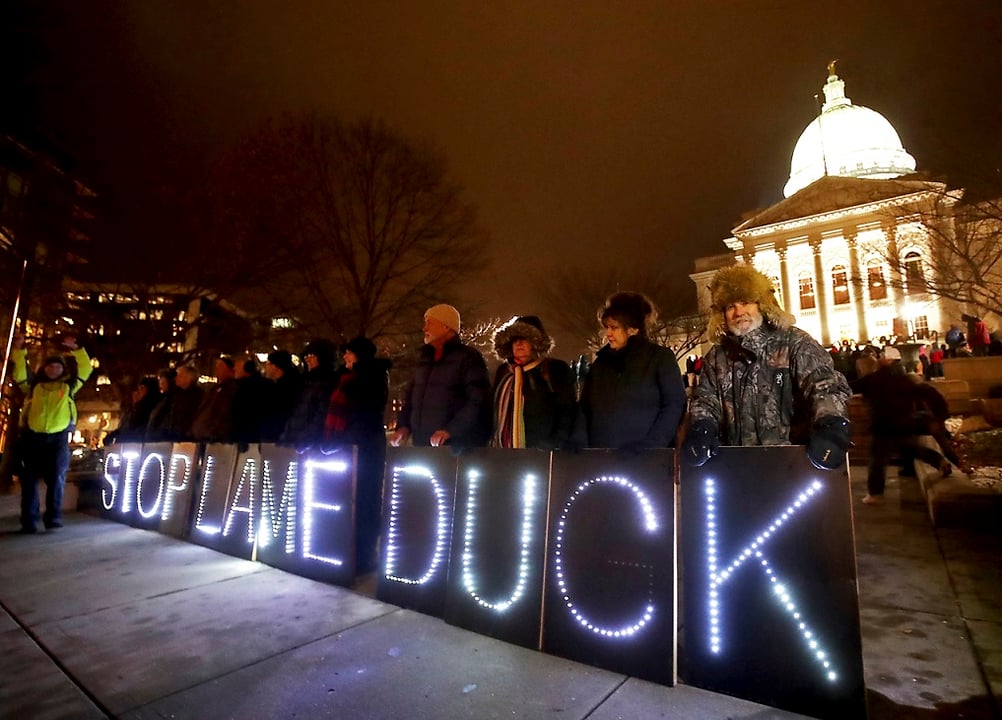MADISON, Wis. (CN) – A federal judge in Wisconsin threw out limits on early voting Thursday that were the result of a controversial GOP-engineered, lame-duck legislative session in December.
U.S. District Judge James Peterson’s five-page ruling states plainly, “This is not a close question: the three challenged provisions are clearly inconsistent with the injunctions that the court has issued in this case.”

The ruling comes after One Wisconsin Institute and other liberal advocacy groups filed a memorandum last month asking Peterson to enforce the court’s previous July 2016 injunction and subsequent order blocking the same types of early-voting restrictions that former Governor Scott Walker signed into law in December, just before leaving office.
The lame-duck legislation limits early voting to only two weeks statewide – voters in the safely Democratic cities of Milwaukee and Madison had as long as six weeks to vote early – and adds hurdles to using state IDs for voting, including changes to the identification petition process, or IDPP, which can be used to get temporary voting credentials while waiting for an official state ID.
Peterson’s ruling called the arguments for the limits on early voting “not persuasive” and granted the plaintiffs’ motion to enforce the court’s injunctions. It also struck down restrictions on the use of student ID cards for voting and time limits on the validity of temporary ID cards.
The judge did not buy the Republican argument that the court’s 2016 injunction was directed at specific laws and that since Act 369 is a new law, it falls outside the scope of the injunction,
“The scope of the injunction relates to conduct that the court concluded was unlawful; the particular statutory provisions at issue are not important,” he wrote. “If the court accepted defendants’ argument, it would mean that a legislative body could evade an injunction simply by reenacting an identical law and giving it a new number.”
Peterson also found it spurious to say, as Wisconsin Republican lawmakers did, that Act 369 passes muster by eliminating some restrictions on in-person voting that the court found to be unlawful. For example, the new law does not place restrictions on hours or locations for in-person voting.
“This argument ignores the fact that the court concluded that each restriction was independently unlawful and enjoined them separately,” Peterson said. “A party cannot avoid an injunction by complying with parts of it while disregarding others.”
He further noted that, “In this case, the new law still restricts the amount of time that a municipality may offer in-person absentee voting. Defendants do not even attempt to show that there is a material difference between the number of days permitted under Act 369 and the number of days permitted under the previous law.”
After Judge Peterson’s original 2016 ruling, both sides appealed and the case was sent to the Chicago-based Seventh Circuit, where it remains today. Following Thursday’s ruling, another appeal is likely.
In a statement Thursday, One Wisconsin Now Executive Director Scot Ross rebuked Assembly Speaker Robin Vos and Republican lawmakers’ lame-duck provisions.
“Robin Vos and the Republicans have been told by the federal court in no uncertain terms that they are not above the law,” Ross said. “The Republican attacks on voting rights were unconstitutional when they were passed, they were unconstitutional when the judge struck them down and they are unconstitutional now.”
Representatives with the Wisconsin Elections Commission could not be reached for comment Thursday afternoon.
Subscribe to Closing Arguments
Sign up for new weekly newsletter Closing Arguments to get the latest about ongoing trials, major litigation and hot cases and rulings in courthouses around the U.S. and the world.








